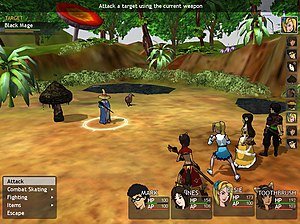
English: Image released to the public domain through the official website at https://markleung.com/gallery/screenshots (Photo credit: Wikipedia)
Video game addiction: Like most things where addiction is in question, the behaviors and call signs are similar. There is an unquenchable desire for more, leading to irritability, anger, despondence, and isolation. Video game addiction isn’t a substance abuse disorder; it as a clinical impulse control disorder, similar to a gambling addiction. In other words, playing the game becomes a compulsive call to action. Role-playing games in particular can evolve into an addictive foe.
Meet George. He’s 13 and he is always seen plugged into a device. It could be an iPhone, or his desktop computer, but he is never without some kind of technical distraction. He’s been like this ever since I can remember—I think he got his first game around 6. As he’s gotten older, he has become more and more involved in the role-playing games online, locking himself away in a room with his headphones on so he can talk to his online “friends.” He is, however, completely anti-social when it comes to interacting with actual people. School is fraught with fights and suspensions, and parental communication is bereft of any real content or authority. At home, if there’s an opportunity for actual play, George will sneak off to play a video game—he did this once during a game of hide-and-seek, leaving his playmate hidden for an extended period of time. From the outside in, this looks troublesome—it IS troublesome–but George’s parents see it as keeping him occupied and engaged. Have we forgotten how to interact with our children? Have we made our own needs and external busyness more important than creating an emotional connection with our kids?
The current generation is the first “native” tech generation. They have never known a life without cell phones, a world without the Internet and its multitude of social media sites, or gaming and the varied choices in virtual realities. These things are just part of this generation’s day-to-day life. Our social environments have been forever changed, and sites like Facebook are often considered to be the sole vehicle for maintaining friendships. I won’t lie, I like that I am able to keep in touch with out-of-state friends because of Facebook. It certainly has its value. Online gaming can be fun. Lots of folks play online games on occasion, and often times, it’s harmless, but there are those (like George) who are seduced by the alluring cyber world of false reality and find themselves getting lost when the digital falsehood becomes more important than reality itself.
According to the Center for Online Addiction, these are the warning signs to look for:
- Your child is playing video games for increasing amounts of time;
- Thinking about gaming during other activities;
- Gaming to escape from real-life problems, anxiety, or depression;
- Lying from friends and family to conceal gaming;
- Feeling irritable when trying to cut down on gaming.
They also suggest keeping note of the following and seeking help as soon as you recognize a problem brewing:
- Log how often your child plays and for how long;
- Problems arising out of gaming;
- Your child’s reaction to time limits.
Treatment for video game addiction is similar to dealing with food addiction in that you have to learn how to live with it and use it responsibly. And you have to detox from the addiction itself by unplugging for a period of time. We are in a computer generation: we live and work on our computers, and if addiction is an issue, then we need to learn to change our relationships to them so we can use them responsibly. Now that we are inundated with technology, we have to learn how to safely navigate the broadly accessible world it’s created. Recovery is possible.
Articles of interest:
Video Game Addiction Among Adolescents: Associations with Academic Performance
and Aggression
NEW RESEARCH ON INTERNET ADDICTION
LEGITIMIZES THE CONTROVERSIAL CLINICAL DISORDER







